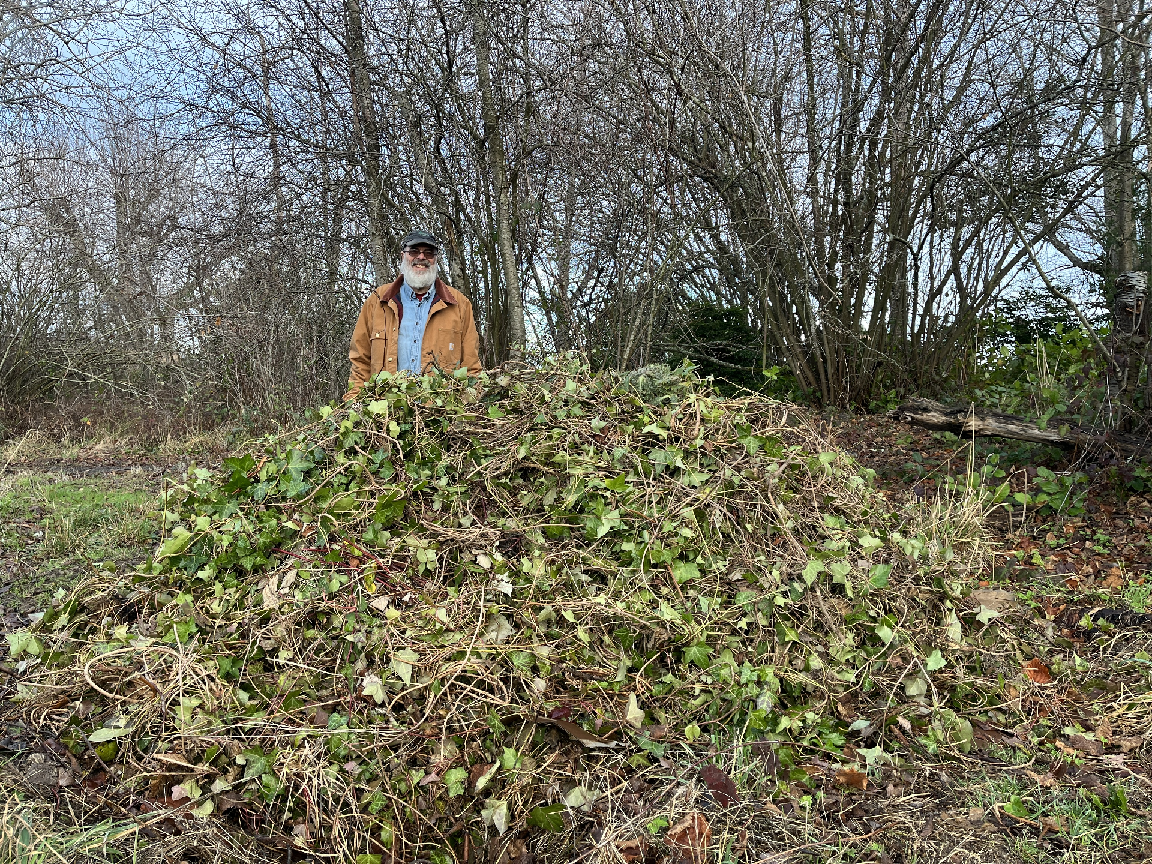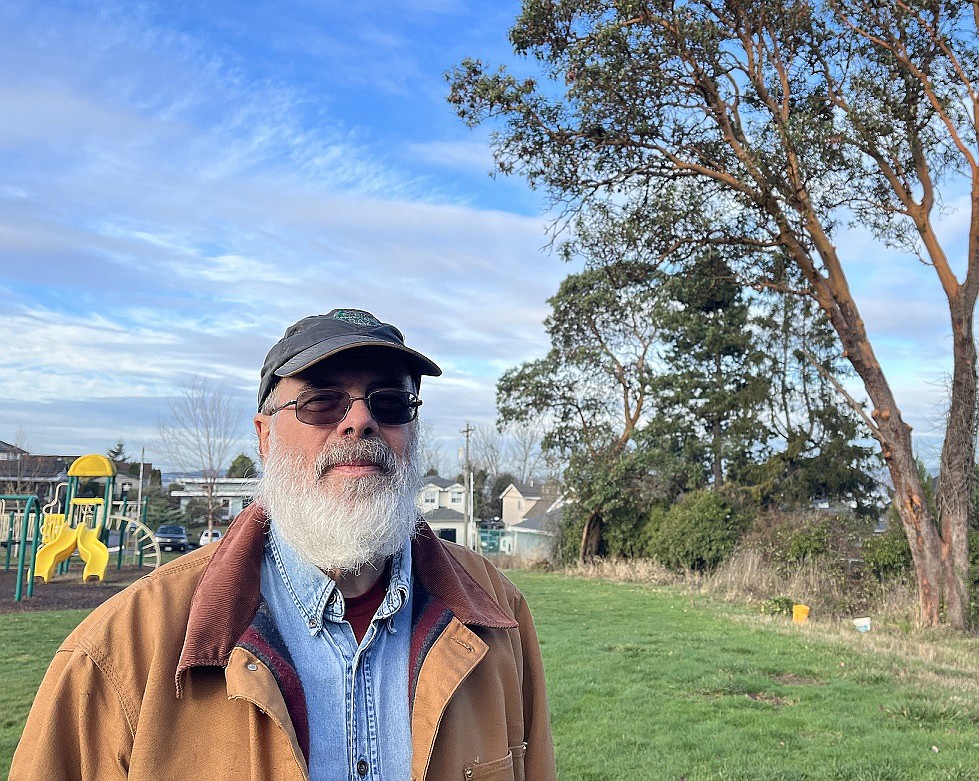Scott Murdock: 4,760 hours of volunteering for parks
January 22, 2023 at 4:08 p.m.
Scott Murdock has racked up nearly 5,000 hours volunteering for Tacoma Parks, pulling invasive species and reclaiming habitat for wildlife
That’s Scott Murdock. Calm, quiet, practical and incredibly generous – after five years of volunteering for Metro Parks’ CHIP-In program and the Point Defiance Zoo & Aquarium’s horticulture team, he’s racked up a whopping 4,760 official hours of ripping ivy and blackberry, spreading mulch and reclaiming land for wildlife in parks around Tacoma.
But to Murdock, it’s just a part of something he’s done ever since he retired: giving back.
“I was born in Seattle, grew up in Olympia and apart from three years working in Idaho, I’ve never lived outside Washington state,” explains Murdock, as we wander the newly-made trail at Browns Point Playfield, one of the sites that Murdock stewards as a volunteer. “Growing up I did a lot of hiking with the Boy Scouts. I loved it.”
But working life intervened, as it often does. Murdock’s a civil engineer who spent the bulk of his career inspecting bridges and ferry terminals for the Washington State Department of Transportation. When he retired in 2014, however, he realized he wanted to get back to hiking – and to give back to those mountains, trails and forests he loved as a boy.
He had already spent years volunteering for other groups like Wilderness Volunteers and the Washington Trails Association (WTA), even spending weeks at a time doing carpentry projects at Holden Village, a retreat center in the North Cascades. A longtime Northeast Tacoma resident, he helped restore Julia’s Gulch, a lush ravine running down from the upper neighborhood to the water.
That year on Parks Appreciation Day, he volunteered for CHIP-In at Alderwood Park – and was hooked.
“It had a lot of ivy and blackberry,” remembers Murdock, who lived close by. “So, I said I’d like to take care of it, to give back.”
Since then, the tall, laconic engineer with a thick white beard has served nine years as park steward, a volunteer who commits to regular monthly hours at a particular park and helps organize other volunteers. He’s been a regular at Alderwood Park and Browns Point Playfield, helping other stewards at Franklin, Titlow, Dickman Mill and Swan Creek Parks. He also volunteers at Point Defiance Zoo, helping the horticulture team keep on top of the extensive botanic gardens there.
“Scott’s years of commitment and passion for assisting with the Zoo’s botanical collection have been outstanding,” comments Zoo horticulturalist Bryon Jones. “The horticultural team looks forward to his weekly visits and his keen eye for detail which he brings to maintaining our grounds and plant collection.”
And his service hasn’t gone unnoticed by others either. He won Tacoma’s 2019 City of Destiny Award for environmental sustainability, and another in 2021 as part of the Zoo team. But he brushes off those accolades with a quiet humility, focusing more on what’s still to be done.
Today, that’s English ivy. Starting around 8 a.m. at the natural trails on the northern edge of Browns Point Playfield, he’s been patiently pulling the invasive vine off towering madrone and fir trees, piling it up to break down naturally. As he works, he points out other massive ivy piles, and hummocky areas of salal, sword fern and huckleberry glistening with dew.
 Scott Murdock behind a mountain of invasive English ivy
Scott Murdock behind a mountain of invasive English ivy
Spending up to 20 hours a week working in parks as he does, educating the public is also a part of the job. One day, clearing all that blackberry, a local resident came up and complained that he was taking away all the habitat for the birds.
Murdock smiles. “I explained to her that what I was doing would let native vegetation grow and thrive, which provides much better food for birds than blackberries,” he says. “And just look around.”
Surrounding us, a joyful twittering chorus rises in the cold morning air – proof of many well-fed birds.
Other benefits of clearing invasives include the ability of Metro Parks and the Washington Trails Association to create more trails, thus protecting plants from human feet and encouraging walkers to explore. Murdock has also found that bringing back the wildlife also discourages unwanted human use, like teenage parties or trash. It also helps the Metro Parks maintenance crews, lightening their load so they can focus on caring for other areas like playgrounds, spraygrounds, playfields and restrooms.
For Murdock, though, the benefits are intensely personal.
“It keeps me busy,” he says. “It’s my exercise program! It’s a great feeling to give back, and I can look around and see what I’ve accomplished. I feel really connected to the neighborhood.”
His favorite part?
“The satisfaction of seeing the park improved and used more,” he sums up. “I see a lot more people walking, taking their dogs…I get compliments all the time.”
Any challenges?
“I don’t know if there is a challenge,” muses Murdock with another smile. “It’s just work. Now if it’s raining heavily, though, I might not go out. I’m getting lazy.”
To learn about work parties or other volunteer work at Tacoma parks see metroparkstacoma.org/chip-in.





